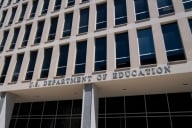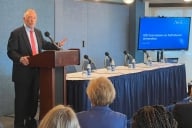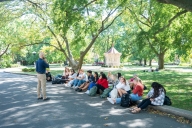You have /5 articles left.
Sign up for a free account or log in.
Three women at a small Baptist seminary, dissatisfied with the response to their complaints of sexual harassment by the president, took their case to the accreditors. The accreditors agreed to investigate whether officials botched their response to the complaints, but some students and staff still want the president removed from office, at least for a time.
The students described their experiences in testimonials sent to peers, trustees, accreditors and the Ministerial Advisory Board, a group of 28 Baptist pastors, many from churches that financially support the John Leland Center for Theological Studies. One student recounted how on separate visits to the office of Leland President Mark J. Olson, she reached out to shake his hand but he pulled her in for a hug, “totally unwelcomed and uninvited,” and seated himself between her and the door.
“We had just met, we were alone in a closed room in an empty building, this was a professional interview and he was in a position of power in deciding the fate of my application for admission,” she wrote. The student writes about other instances where Olson “put her in a sort of headlock position,” kissed her on top of the head, hugged her for too long, and lingered and followed her around. “I feel a responsibility to warn potential female students ... for their own safety. I question whether or not female students have equal access to education at Leland due to the prevalence of sexual harassment against them on campus.”
The accreditors say they are only interested in whether trustees and administrators followed the appropriate policies up to and after they decided to warn, but not punish, Olson. They’re less concerned about the allegations of inappropriate hugging and touching, and that’s not what they planned to ask about when they visited campus this week.
Whatever the outcome, it may not satisfy the complainants – two students and an employee – who say they were left in the dark during the seminary's investigation and resolution, or members of the faculty that voted “no confidence” in the actions of the trustees and in the president under these circumstances.
“Under the circumstances, stepping away, at least for a semester while getting counseling, was what the faculty felt was a baseline for moving forward in a healthy way,” said Jim Melson, the complainants’ advocate to administrators and an adjunct and director of spiritual formation at Leland. The complainants, who have since left the Leland campus and asked to remain anonymous, say they are not the only ones who have complained about Olson and sexual harassment.
“The best resolution,” Melson said, “would be the acceptance of the faculty motion and the restoration of the women on campus.”
The other student recounted similar behavior in her testimonial – “a pulling/pushing motion of the head to include his kissing or caressing the head and neck” and “excessive touching on the arms, backs and rubbing of the hands upon meeting a person” – and described one occasion where she used her purse as a barrier when Olson tried to pull in for a hug. She started avoiding campus and questioning whether she should stay at Leland.
“It is counterintuitive that a seminary that prides itself on the pursuit of developing transformational leaders for the advancement of Christ’s Kingdom models the exact opposite,” the first student wrote. “The Board of Trustees should be ashamed to act on behalf of a Christian institution in a way so counter to the calling of Christ.”
Olson and the trustees have held several open-door meetings for faculty members and students to talk about the issue. But since the most recent meeting three weeks ago, two administrators and one faculty member have announced their resignation at least in part due to the ongoing issue, the students said.
The president acknowledged in an interview that he made people uncomfortable (and he doesn’t hug anymore). But he stressed that his interactions with students and professors have been shaped by decades in the Baptist church, where church-goers are like family and hugs are as common as handshakes.
“I think most people are ready to move on; that doesn’t mean everybody agrees with what was done,” Olson said. “We need to be held to a higher standard at the seminary, I think, than any secular school would be, because of the sexual ethic that the scripture teaches us. And we’re an evangelical seminary, so for us, scripture is the bottom line.”
Several devoutly religious colleges have been accused recently of mistreating and neglecting rape victims. At Patrick Henry College, as The New Republic reported, lectures "compared women who have had sexual contact before marriage to used cars." Students were discouraged from reporting rape, they said, and alleged perpetrators were let off the hook. And at Pensacola Christian College, a rape victim said she was faulted for her "sin," and told to forgive the perpetrator to get "God's grace and forgiveness."
Those cases, and the one at Leland, highlight the latitude -- and risk -- administrators can take on campuses that don't receive federal Title IV funds. These colleges aren't subject to oversight from the U.S. Education Department's Office for Civil Rights, which has been cracking down on campuses for mishandling student assaults and investigations.
"There's a huge chasm to what a campus subject to Title IX would do and those that are not," said Brett Sokolow, president of the National Center for Higher Education Risk Management. "You've seen that play out in these cases."
However, none of those incidents involved a president as the accused. Leland had a policy in its employee handbook marking a "warning" as the appropriate disciplinary action "for a first offense" that was not of "a serious nature, such as a soliciting of sexual favors," said Darrel Foster, chair of the board.
"It was certainly a difficult experience for the board, it was a difficult experience for Dr. Olson," Foster said. "But at the same time, we felt that we had satisfactorily dealt with the factual issues that were there."
Removing the president, Foster said, "would have been a complete overreaction," not to mention a violation of policy and potential invitation of legal action. The board voted in May 2013, and reaffirmed the decision in October, to instead issue the warning to Olson.
That decision hinged on the facts that during interviews, the women said there was no unwanted touching or solicitation of sexual favors, none of them ever confronted Olson about his behavior, and they did not think his actions were "sexually motivated," Foster said.
"The purpose of the disciplinary action was primarily, more than anything else, to make sure Dr. Olson was aware that any type of physical behavior that was perceived in a way other than he intended was nevertheless still a problem," he said.
This is not the first time an Association of Theological Schools investigation has stemmed from individual complaints of sexual harassment, said Lester Edwin J. Ruiz, director of accreditation and institutional evaluation at ATS. But he emphasized that the harassment itself is not what the accreditors are interested in.
“It’s not about individual grievances,” Ruiz said. “They’re looking at whether the school has violated accreditation standards.”
Some of Leland’s processes appear flawed when compared to common best practices, Sokolow said: after a thorough investigation, alleged victims should be offered some remedy and be informed of any resolution with the offender. The students say the investigation was rushed, their confidentiality was violated, and they weren’t told how Olson was disciplined. They never got any “official response,” they said, and there was no follow-up counseling or support.
“I think it still falls short,” Sokolow said.
When the problems first arose, Leland had multiple sexual assault policies, which complicated administrators' response. Because two students filed complaints, officials would normally have followed the student handbook policy on sexual harassment. But that policy called for the president to appoint a faculty committee to investigate the complaints. Because it would be a conflict of interest for the president to appoint his own investigators, the board opted to follow the employee handbook policy, which put the trustees in charge of adjudication. (The students point out that Olson appoints board members, so the process still may not have been totally conflict-free.)
Over the last several months, Leland officials have revised and streamlined their sexual harassment policies. They now include guidelines for reporting and responding to a case of sexual harassment. After “the appropriate adjudicatory body” assesses the situation, the handbook says, in the case of an employee, the body will either warn that additional acts of harassment will result in further disciplinary action (up to and including termination), or suspend or fire the employee when there is “an extremely serious violation of this policy.” Students would be either warned, suspended or expelled.
Ruiz declined to get into the specifics of the ATS reviewers’ investigation, but Olson said he believes that Leland’s move to revise its policies will work in its favor: “I think they’ll be pleased.”
ATS will either give Leland a warning, put it on probation or pull its accreditation.
The students insist that they went to ATS as a last resort, and that they still don’t want to bring lawyers or police into the picture. But they believe the board is protecting the president, they said in interviews, and ran out of places to go.
“Our goal is to change the environment and change the way things are done,” one of the students said. “Not to let it be settled out of court in a financial payoff.”
But taking the claims outside the Leland community at all is an affront to some. The students and Olson agreed that resolving the situation within the seminary would have been the ideal solution.
“It saddens me that they would take an action that would put the entire institution in jeopardy,” said Foster, the board chair. “The very fact [ATS is] coming means the body that accredits us is watching us. The very fact that we have to go through this means that we have been put in a situation of potential jeopardy.”








